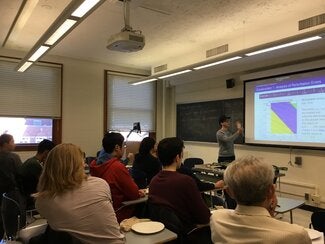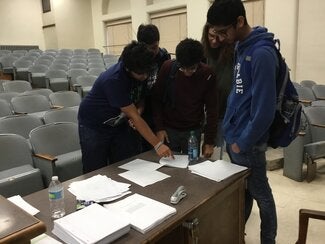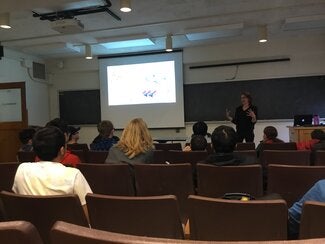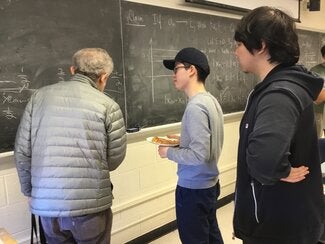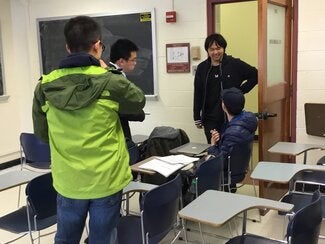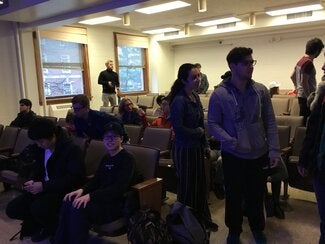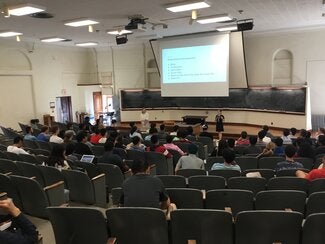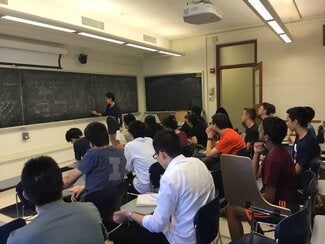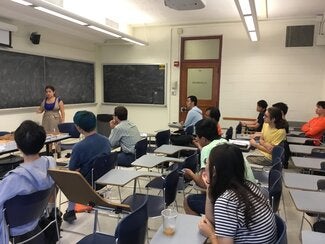The Undergraduate Friday Seminar (UFS) is a weekly event aimed at showing undergraduate mathematics students what they can experience from the professional world of mathematics research. Every Friday, we sit down with a different speaker as they tell us all about the interesting work they do and some of the neat results from their field!
Unlike many seminars, we make it a point to have material presented at a level that even the youngest of mathematicians can grasp. We also include undergraduates as our presenters; all of which is done in an effort to cultivate a generation of mathematicians who can accurately and engagingly present their work and interests to others.
To receive notification of upcoming seminars, please sign up for the Undergraduate Friday Seminar listserv by contacting undergradseminar@math.illinois.edu and asking to be added.
UFS Schedule 2022–23
The UFS schedule for 2022–23 will be available soon. Please check back for updates!
Interested in Presenting?
If you have any questions about these weekly seminars, or wish to give a presentation during the semester, feel free to email us at undergradseminar@math.illinois.edu. (See below for a list of previous topics and presentations.)
Previous Seminars
Speaker: Vesna Stojanoska (UIUC Math)
Title: The shape of numbers
Abstract: We'll be joined by Dr. Vesna Stojanoska! Dr. Stojanoska is an associate professor here at UIUC doing research in homotopy theory and some of its applications, and has managed an IGL project on the same topic for the past three semesters. On Friday, she'll be here to talk about a connection from partitions of natural numbers to structures in algebraic topology:
- Take a natural number n, and look at all possible ways to break up the numbers from 1 to n into several groups. These are called partitions. Two partitions are linked if one can be obtained from the other by breaking up some groups.
- Three partitions are linked if one is obtained from the other by breaking up, and the third is obtained by breaking up further. Similarly, we can define when any number of partitions are linked. Studying these linkage properties gives rise to a shape associated to the number n, whose symmetries know about deep structures in algebraic topology.
Speaker: Nick Kokkines and Andre Park (senior and freshman undgrads, UIUC Math)
Title: Visualizing Number-Theoretic Fourier Series
Abstract: We use Mathematica to explore Fourier series with coefficients given by number-theoretic functions, such as the Moebius function. By plotting the trajectories of such Fourier series in the complex plane, we observe a remarkable variety of behaviors, ranging from fractal-like patterns to smooth curves to chaotic and unpredictable outcomes. In certain cases, we were able to explain the observed behavior, while in others, we formulated conjectures that predict the type of pattern that can arise.
Speaker: Madie Farris (PhD student, UIUC Math)
Title: IGL Info Session
Abstract: This week, we'll be joined by Madie Farris! Madie is a PhD student here in the Math program and also the Research Manager for the Illinois Geometry Lab. On Friday, they'll be joining us to give some helpful info about the IGL - tips for applying, potential future research projects, and more...
Speaker: Christopher Gottardi-Littell (junior undergrad, UIUC Math)
Title: An Introduction to Geometry in Physics
Abstract: Since Newton’s breakthrough, mathematicians have examined classical mechanics in terms of modern theories of space. The result is a series of mathematical pictures of the world we see. I will introduce the Lagrangian and Hamiltonian formulations of mechanics, with emphasis on the geometric structures in which they are phrased.
Speaker: Ian Copple (senior undergrad, UIUC Math + Secondary Education)
Title: Outreach & Animation: Making Mathematics Come to Life!
Abstract: Using the free, online graphing tool Desmos to educate, animate, and share beautiful ideas with any audience, regardless of their mathematical background. For some examples of what we'll talk about, you can view some of the animations here.
Speaker: Ada Stelzer (UIUC Math)
Title: Fixing the Cross Product: An Introduction to Geometric Algebra
Abstract: This week, we'll be joined by Ada Stelzer! Ada is a first-year PhD student here in the Math department with interests among algebra, category theory, and the foundations of mathematics. And on Friday she'll be here to talk about a solution to some of the problems arising from commonly taught techniques to manipulate vectors:
Fixing the Cross Product: An Introduction to Geometric Algebra
Although vectors are a fundamental object of study in mathematics and physics, it is surprisingly difficult to find a good way to multiply them. The dot and cross products commonly taught in schools work for many computational purposes, but they lack several key properties we might desire or expect from a vector product. Fortunately, there's a solution to these problems! In this talk we will explore geometric algebra, which draws numerous algebraic models of space together into a unified framework, elegantly providing vast generalizations of vector algebra and vector calculus while simultaneously offering deeper insight into the geometry of vectors, complex numbers, and more. Minimal background will be assumed beyond some prior exposure to vectors.
Speaker: Raghavendra Bhat (UIUC Math/Computer Science)
Title: Distribution of square prime numbers
Abstract: This week, we'll be joined by Raghavendra Bhat! Raghav is an undergraduate here in the Math department, with a minor in Computer Science. His research is primarily in Analytic and Computational Number Theory, and his recent paper on square prime numbers has been accepted for publication in the Missouri Journal of Mathematical Sciences! On Friday, he'll be here to talk about that work:
Distribution of Square Prime Numbers
A number that is the product of a prime and square (square not 1) is defined as a square prime number. We study the asymptotic distribution, cardinality, and some other properties of these numbers, based on a recently published paper of mine.
Speaker: Brevan Ellefsen (UIUC Math, Grad Student)
Title: When are two knots the same?
Abstract: It is easy to tie knots, but hard to tell knots apart. As such, mathematicians have developed many tools and techniques to distinguish kno ts. In this talk, I discuss elementary knot invariants and introduce the Jones Polynomial as a powerful, combinatorial tool to differentiate many knots. Also, courtesy of the IGL, there will free pizza provided at the meeting!
Speaker: Joey Palmer (UIUC Math)
Title: Minimal models of Delzant polygons
Abstract: How can we study something four-dimensional? It turns out that in some highly symmetric cases, four dimensional objects can be represented by two-dimensional pictures. For instance, four-dimensional spaces called symplectic toric 4-manifolds can be represented by two-dimensional shapes called Delzant polygons. Symplectic geometry is the language of many physical problems, from pendulums to string theory, and therefore understanding properties of Delzant polygons can lead to solutions to interesting problems in physics. In this talk I will present a novel proof to a classical result, giving a recipe to obtain all possible Delzant polygons. The proof proceeds by rephrasing the question several times: we translate the question about Delzant polygons to one about integer vectors, which in turn becomes a question about matrices, which finally we change into a question about certain lists of integers. We conclude the proof by classifying these lists of integers.
Recorded presentation is here.
Speaker: Reuven Hodges (UIUC Math)
Title: Straightening fillings of Young diagrams
Abstract: Young diagrams are fundamental combinatorial objects in representation theory, algebraic combinatorics, and algebraic geometry. Many constructions that rely on these objects depend on a process called straightening that expresses a filling of a Young diagram as a sum of other distinguished fillings, subject to certain relations. In this talk I will introduce Young diagrams, fillings, straightening, and discuss a new non-iterative rule for straightening. The only background assumed is a familiarity with vector spaces.
Recorded presentation is here.
Speaker: Richard Sowers (UIUC Math)
Title: Mathematics, big data, and mobility
Abstract: We look at some mobility data from New York city from a mathematical perspective. We use several recent techniques from big data to identify patterns. Our interests will be traffic accidents, matrix decompositions, and the topology of congestion. The goal of the talk will be to understand how mathematics can help us understand some properties of complex human behavior.
Recorded presentation is here.
Speaker: Eliot Kaplan (UIUC Math)
Title: An introduction to the surreal numbers
Abstract: Conway’s surreal numbers were introduced in the context of combinatorial game theory. These days, they are mostly studied by model theorists and other logicians. I will walk through the recursive construction of these numbers and their algebraic operations (addition, multiplication, exponentiation). Then, I’ll discuss some properties of the surreals which interest model theorists. Time permitting, I’ll talk about some more recent connections with transseries and hyperexponential functions.
Speaker: AJ Hildebrand, UIUC Math
Title: Benford's Law: Adventures in undergraduate research
Abstract: If one makes a list of the areas of all 200 countries in the world, one finds that around 30 percent of those numbers begin with the digit 1, around 17 percent begin with the digit 2, while only around 5 percent begin with the digit 9. Similar frequencies of first digits have been observed in all sorts of real world data—from populations of cities to heights of tallest buildings to numbers in tax returns and numbers of Twitter followers. This near-universal phenomenon is called Benford's Law. In the first part of this talk I will give an overview of Benford's Law and its applications and explain the math behind it. In the second part I will focus on Benford's Law for mathematical sequences such as the powers of 2. I will describe an undergraduate research project that started out back in 2015 as an IGL project, then turned into a multi-year research adventure full of surprises and unexpected twists, and ended up being the most fun, rewarding, and interesting undergraduate research project I have ever supervised.
Speaker: Olivia Beckwith, UIUC Math
Title: Primes represented by binary quadratic forms
Abstract: Let Q(x,y) = ax2 + bxy + cy2, where a, b, and c are integers. Which prime numbers are of the form Q(x,y), for some integers x and y? This classical number theory question is connected to rich areas of math, including algebraic number theory, class field theory, and modular functions. This talk will introduce one of the fundamental elements of this theory: the group structure on equivalence classes of binary quadratic forms of a fixed discriminant.
Speaker: Vaibhav Karve, UIUC Math
Title: Satisfiability: Why some problems are easy, while others are hard
Abstract: I will introduce a 50-year-old problem called Boolean Satisfiability (or simply SAT) and I will explain why we should care about it. We will explore how an abstract-looking problem can end up being connected to circuits, airline scheduling, Rubiks cubes, chess, video games, and travelling salesmen. I will explain how small SAT are easy and how big SAT can be hard -- and how we quantify the hardness of a problem. By the end of the talk, we will have learned some computer science as well.
Speaker: Jared Bronski, UIUC Math
Title: The mathematics behind two puzzles
Abstract: I plan to talk about two puzzles with very elegant mathematical solutions. I would encourage you to think about (but not Google!) these puzzles, particularly the easier version of the first puzzle, before the talk. All of them can be found in the attachment below. We'll also need volunteers for a demonstration on Friday, so if you'd like to help please email Derek Thomas (at the email address below).
Puzzle Info: Download here.
Speaker: Alexi Block Gorman, UIUC Math
Title: Opportunities in the Illinois Geometry Lab
Abstract: Ever wonder what it means to do research in mathematics? Or are you interested in mathematical puzzles and pedagogy? Come learn about research and outreach opportunities that the Illinois Geometry Lab (IGL) provides for undergraduate students. The research students do in the IGL is designed to be understood--and performed--by undergraduate participants. The topics for these projects range from very applied mathematics to highly theoretical. I will explain the IGL's application process, and offer some tips on how to write a successful application. I will also mention some of the community engagement opportunities we offer to get involved with math outreach through the IGL. All are welcome!
Speaker: Eric Samperton, UIUC Math
Title: Computing with braids
Abstract: This talk will be a mash-up of some basic ideas in topology and computer science. The braid group on n strands is a mathematical abstraction of the collection of “braid patterns” one can form by braiding n ropes around each other. It plays an important role in many parts of topology and group theory. I’ll begin by introducing the braid group, it’s relation to knot theory, and the important concept of a "group action.” We’ll then see how various actions of the braid group can be used to simulate computers—both quantum and classical. We’ll learn some basic theoretical computer science along the way.
Speaker: Patrick Allen, assistant professor, member of the Number Theory Group @ Illinois
Title: The Arithmetic of Quadratic Fields
Abstract: It is often said that the prime numbers are the building blocks of the integers, the precise statement of which is the fundamental theorem of arithmetic: any integer greater than one can be factored uniquely as a product of prime numbers. What if we move beyond the integers? The simplest cases to consider are the analogues of the integers in what are called quadratic fields, which are number systems obtained from adding to the rational numbers the square root of some fixed integer. Whether or not these quadratic integers satisfy the analogue of the fundamental theorem of arithmetic turns out to be very subtle and both what is known and what is not known are rather surprising.
Speaker: Kyle Begovich, Mathematics and Computer Science Senior @ Illinois
Title: Python Workshop
Abstract: Kyle will be working at Google as a software engineer at the end of this semester. He'll be running a workshop on Python through Project Euler, a great way to get a jumpstart on learning some of the basics of solving problems through coding. No prior coding experience is needed for this workshop! Project Euler is an online platform for students in any discipline to work on “challenging mathematical/computer programming problems that will require more than just mathematical insights to solve”. In this time of remote work, a platform that is online and well-suited to developing problem-solving techniques can provide a good outlet for learning new skills, developing your analytic senses, and interacting with a community of mathematical thinkers. This seminar will help you set up an environment, discuss common approaches to work on these problems, and walk through some early problems to get you started.
Speaker: Sean English, J.L. Doob Research Assistant Professor
Title: How to Tile Your Bathroom: An Extremely Impractical Guide from a Mathematician
Abstract: Tilings have been considered by mathematicians for centuries and by artists for millennia. The main question for tiling problems involves asking if a small number of shapes can be used to cover an entire geometric region without gaps or overlaps. We will briefly talk about some of the history behind tilings, then we will explore many interesting different directions these sorts of problems can take. We will explore some questions as simple as "which regular polygons can tile the plane?" to questions as obscure as "do chickens give rise to a periodic tiling?" Disclaimer: Unless your bathroom is infinite in size, follows spherical or hyperbolic geometry, or has a floor that is more than two dimensional, this talk may not actually be helpful for tiling your bathroom
Title: Julia Robinson and Hilbert's Tenth Problem (film)
Abstract: Julia Robinson was the first woman elected to the mathematical section of the National Academy of Sciences, and the first woman to become president of the American Mathematical Society. While tracing Robinson's contribution to the solution of Hilbert's tenth problem, the film illuminates how her work led to an unusual friendship between Russian and American colleagues at the height of the Cold War.
Speaker: Raghavendra Bhat, Freshman Mathematics Major, UIUC
Title: Prime Number Conjectures
Abstract: Freshman math major and author (Math -- A Subtle Language of the Universe) Raghavendra Bhat will present some of his prime number conjectures, which he has presented on many platforms across the world. His talk will focus on his recent conjectures and thoughts on number theory research and math in general.
Speaker: David Altizio, University of Illinois at Urbana-Champaign
Title: A Brief Introduction to Problem Writing
Abstract: Many of the best mathematics competition problems push the boundaries of pre-calculus math in unexpected ways. While these questions fuel the popularity of contests among middle and high school students, they also make competitions seem inherently unsustainable; constructing these questions appears to be a Herculean task. In this talk, I will shed some insight into how problems are made by exploring my eight-year-long journey through problem writing. In particular, I will discuss common writing philosophies, sources of inspiration, and the stories behind some of my favorite creations.
Speaker: Robert Joseph Rennie, University of Illinois at Urbana-Champaign
Title: What Is A Mathematics?
Abstract: In this talk, I will begin with a mathematization of the process of mathematization. We will then see how category theory and type theory provide a nice general framework for constructing and comparing systems of math. This discussion will motivate, without ever mentioning topological spaces, the study of higher toposes to anyone who cares about theoretical physics (not necessarily just those who study it). This talk requires only an interest in thinking about how math works.
